Analysis of Belonging, Being, Becoming in Early Childhood Settings
VerifiedAdded on 2022/08/23
|10
|2592
|28
Report
AI Summary
This report analyzes the Early Years Learning Framework (EYLF) in Australia, focusing on the key principles of Belonging, Being, and Becoming. The analysis is based on observations from three different early childhood settings, including observations of cooperative behavior, event recordings, and individual child behavior. The report examines how these observations relate to the EYLF principles of secure, respectful, and reciprocal relationships, partnerships, high expectations, and equity. It discusses the importance of creating positive spaces for children and families to foster competent citizens. The report also highlights the significance of peer interactions, exclusion, and inclusion in social development, and the role of educators in supporting children's wellbeing. The combined analysis summarizes the learning experiences and links to the key principles of Belonging, Being, and Becoming, emphasizing the need for a flexible and supportive learning environment tailored to each child's needs.
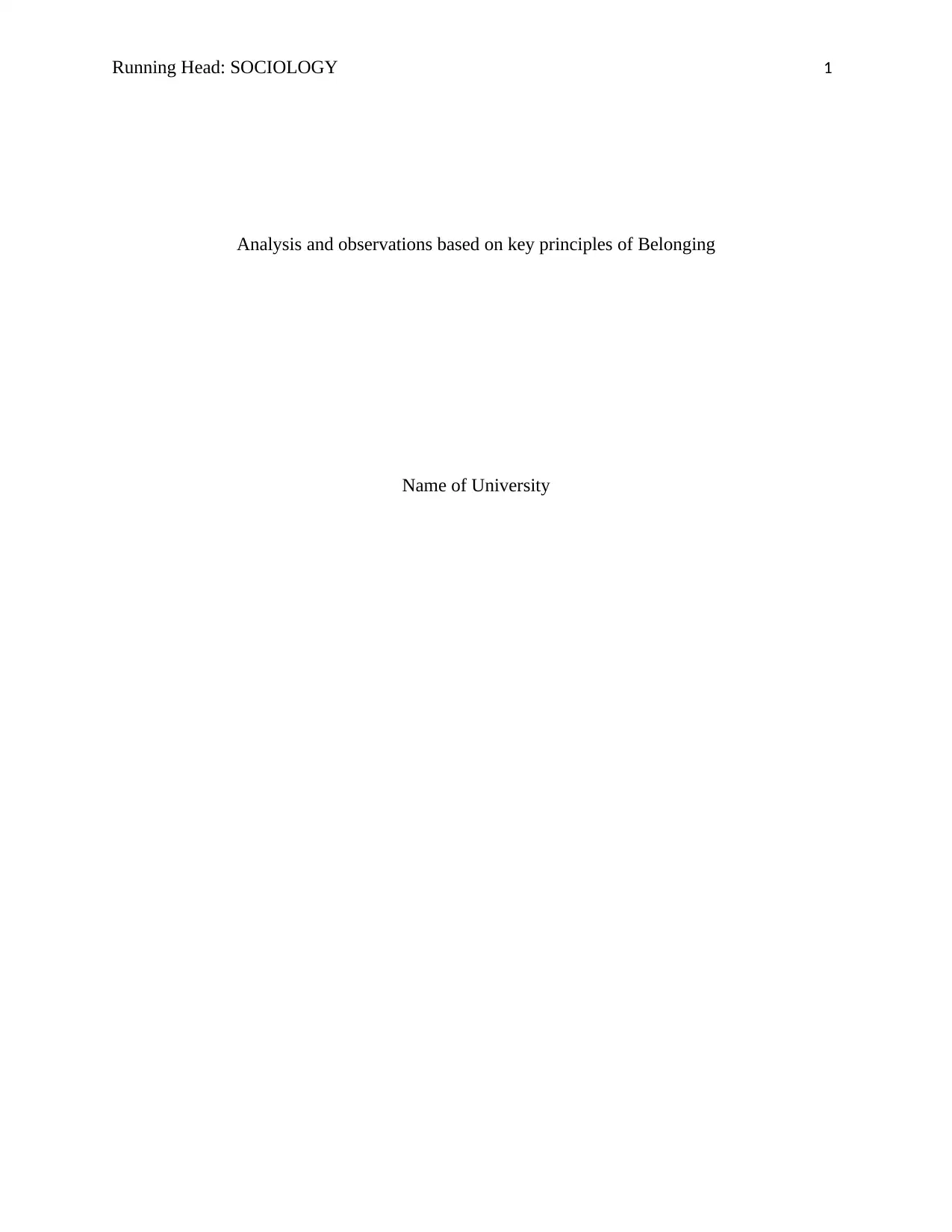
Running Head: SOCIOLOGY 1
Analysis and observations based on key principles of Belonging
Name of University
Analysis and observations based on key principles of Belonging
Name of University
Paraphrase This Document
Need a fresh take? Get an instant paraphrase of this document with our AI Paraphraser
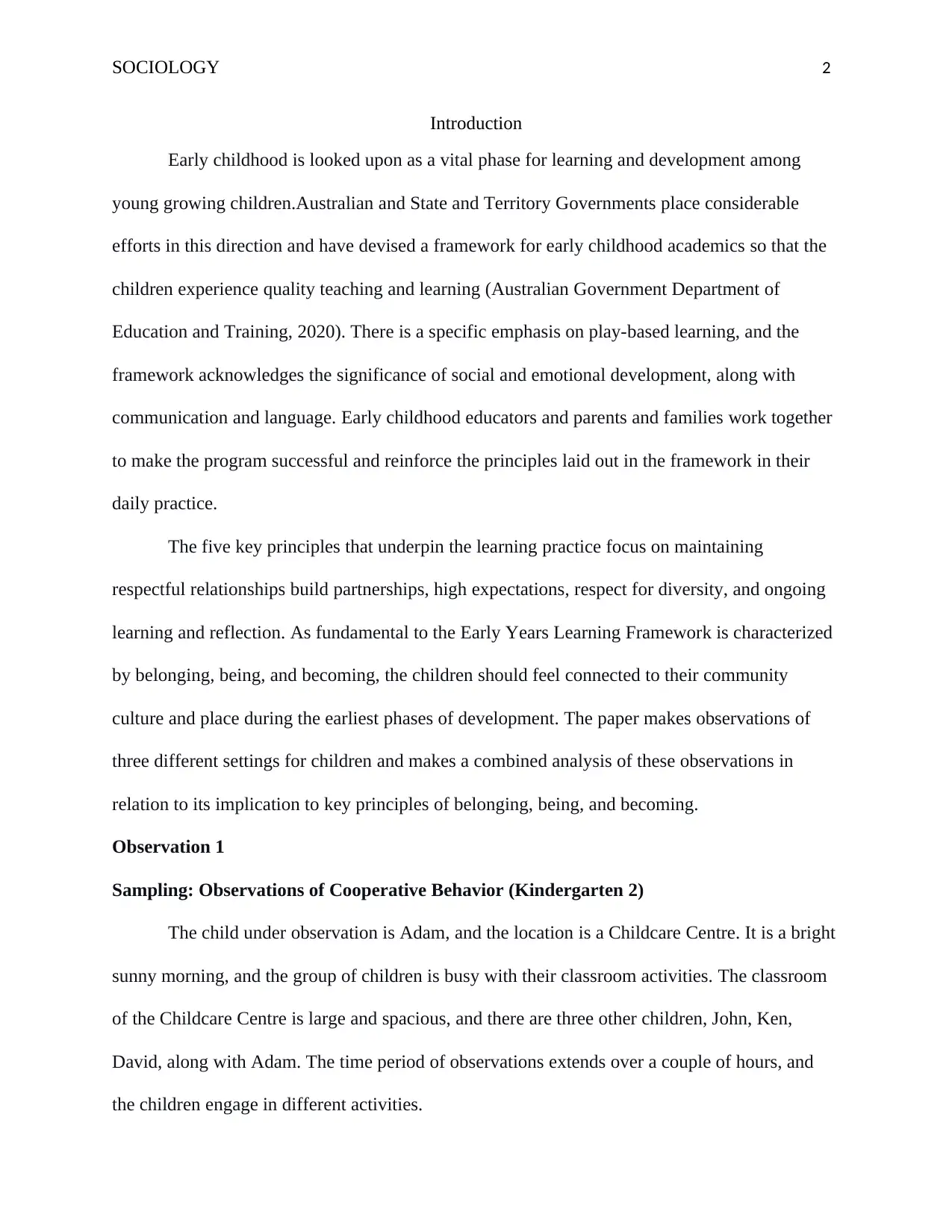
SOCIOLOGY 2
Introduction
Early childhood is looked upon as a vital phase for learning and development among
young growing children.Australian and State and Territory Governments place considerable
efforts in this direction and have devised a framework for early childhood academics so that the
children experience quality teaching and learning (Australian Government Department of
Education and Training, 2020). There is a specific emphasis on play-based learning, and the
framework acknowledges the significance of social and emotional development, along with
communication and language. Early childhood educators and parents and families work together
to make the program successful and reinforce the principles laid out in the framework in their
daily practice.
The five key principles that underpin the learning practice focus on maintaining
respectful relationships build partnerships, high expectations, respect for diversity, and ongoing
learning and reflection. As fundamental to the Early Years Learning Framework is characterized
by belonging, being, and becoming, the children should feel connected to their community
culture and place during the earliest phases of development. The paper makes observations of
three different settings for children and makes a combined analysis of these observations in
relation to its implication to key principles of belonging, being, and becoming.
Observation 1
Sampling: Observations of Cooperative Behavior (Kindergarten 2)
The child under observation is Adam, and the location is a Childcare Centre. It is a bright
sunny morning, and the group of children is busy with their classroom activities. The classroom
of the Childcare Centre is large and spacious, and there are three other children, John, Ken,
David, along with Adam. The time period of observations extends over a couple of hours, and
the children engage in different activities.
Introduction
Early childhood is looked upon as a vital phase for learning and development among
young growing children.Australian and State and Territory Governments place considerable
efforts in this direction and have devised a framework for early childhood academics so that the
children experience quality teaching and learning (Australian Government Department of
Education and Training, 2020). There is a specific emphasis on play-based learning, and the
framework acknowledges the significance of social and emotional development, along with
communication and language. Early childhood educators and parents and families work together
to make the program successful and reinforce the principles laid out in the framework in their
daily practice.
The five key principles that underpin the learning practice focus on maintaining
respectful relationships build partnerships, high expectations, respect for diversity, and ongoing
learning and reflection. As fundamental to the Early Years Learning Framework is characterized
by belonging, being, and becoming, the children should feel connected to their community
culture and place during the earliest phases of development. The paper makes observations of
three different settings for children and makes a combined analysis of these observations in
relation to its implication to key principles of belonging, being, and becoming.
Observation 1
Sampling: Observations of Cooperative Behavior (Kindergarten 2)
The child under observation is Adam, and the location is a Childcare Centre. It is a bright
sunny morning, and the group of children is busy with their classroom activities. The classroom
of the Childcare Centre is large and spacious, and there are three other children, John, Ken,
David, along with Adam. The time period of observations extends over a couple of hours, and
the children engage in different activities.
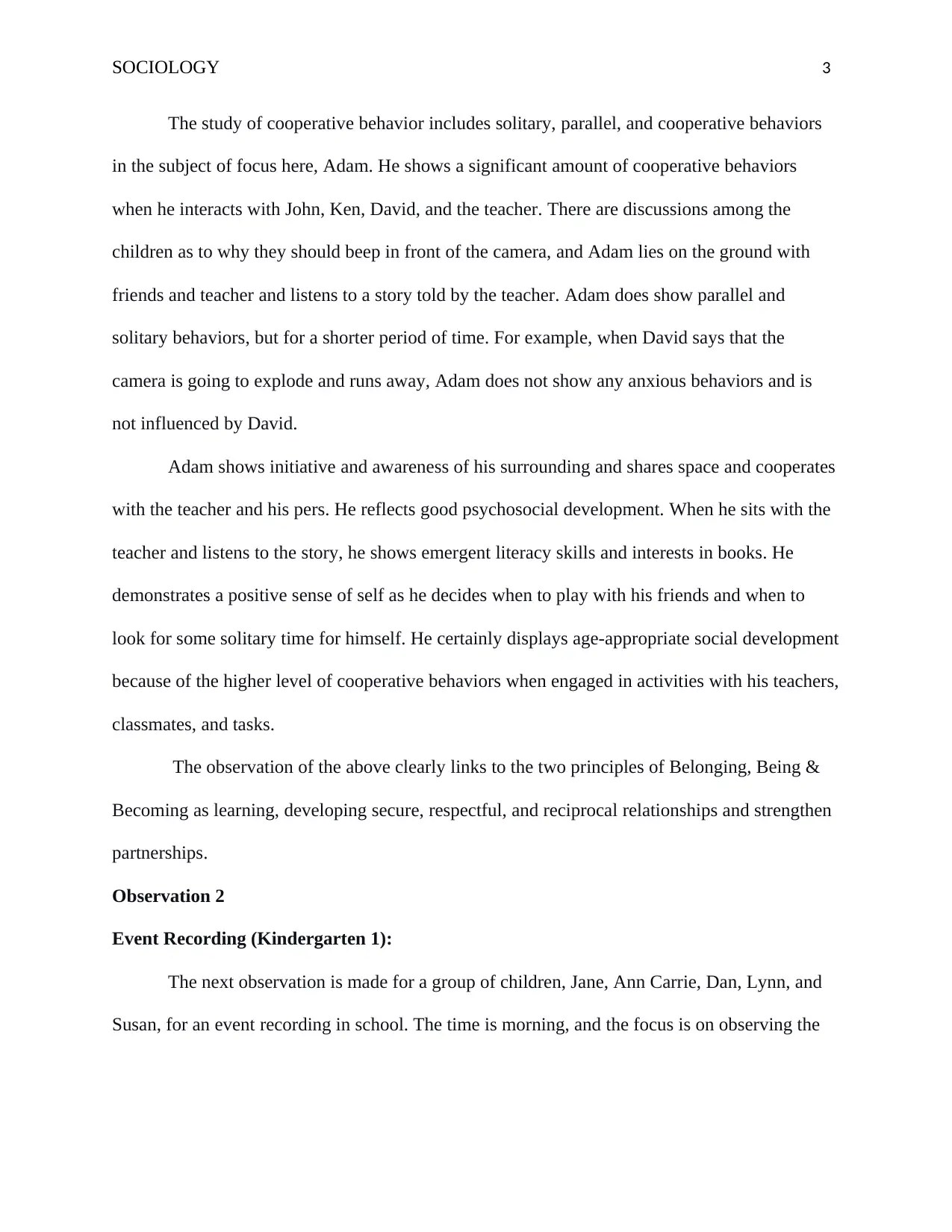
SOCIOLOGY 3
The study of cooperative behavior includes solitary, parallel, and cooperative behaviors
in the subject of focus here, Adam. He shows a significant amount of cooperative behaviors
when he interacts with John, Ken, David, and the teacher. There are discussions among the
children as to why they should beep in front of the camera, and Adam lies on the ground with
friends and teacher and listens to a story told by the teacher. Adam does show parallel and
solitary behaviors, but for a shorter period of time. For example, when David says that the
camera is going to explode and runs away, Adam does not show any anxious behaviors and is
not influenced by David.
Adam shows initiative and awareness of his surrounding and shares space and cooperates
with the teacher and his pers. He reflects good psychosocial development. When he sits with the
teacher and listens to the story, he shows emergent literacy skills and interests in books. He
demonstrates a positive sense of self as he decides when to play with his friends and when to
look for some solitary time for himself. He certainly displays age-appropriate social development
because of the higher level of cooperative behaviors when engaged in activities with his teachers,
classmates, and tasks.
The observation of the above clearly links to the two principles of Belonging, Being &
Becoming as learning, developing secure, respectful, and reciprocal relationships and strengthen
partnerships.
Observation 2
Event Recording (Kindergarten 1):
The next observation is made for a group of children, Jane, Ann Carrie, Dan, Lynn, and
Susan, for an event recording in school. The time is morning, and the focus is on observing the
The study of cooperative behavior includes solitary, parallel, and cooperative behaviors
in the subject of focus here, Adam. He shows a significant amount of cooperative behaviors
when he interacts with John, Ken, David, and the teacher. There are discussions among the
children as to why they should beep in front of the camera, and Adam lies on the ground with
friends and teacher and listens to a story told by the teacher. Adam does show parallel and
solitary behaviors, but for a shorter period of time. For example, when David says that the
camera is going to explode and runs away, Adam does not show any anxious behaviors and is
not influenced by David.
Adam shows initiative and awareness of his surrounding and shares space and cooperates
with the teacher and his pers. He reflects good psychosocial development. When he sits with the
teacher and listens to the story, he shows emergent literacy skills and interests in books. He
demonstrates a positive sense of self as he decides when to play with his friends and when to
look for some solitary time for himself. He certainly displays age-appropriate social development
because of the higher level of cooperative behaviors when engaged in activities with his teachers,
classmates, and tasks.
The observation of the above clearly links to the two principles of Belonging, Being &
Becoming as learning, developing secure, respectful, and reciprocal relationships and strengthen
partnerships.
Observation 2
Event Recording (Kindergarten 1):
The next observation is made for a group of children, Jane, Ann Carrie, Dan, Lynn, and
Susan, for an event recording in school. The time is morning, and the focus is on observing the
⊘ This is a preview!⊘
Do you want full access?
Subscribe today to unlock all pages.

Trusted by 1+ million students worldwide
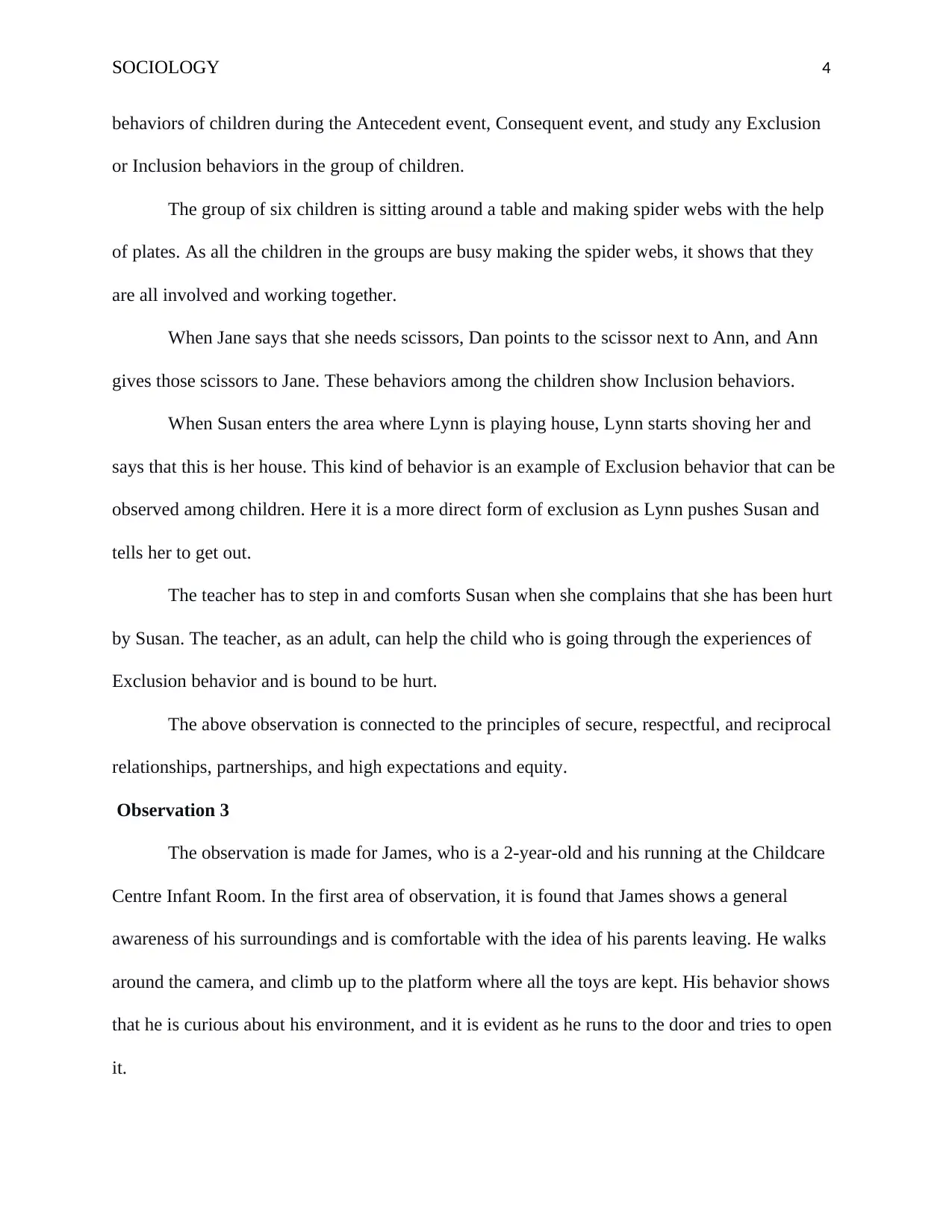
SOCIOLOGY 4
behaviors of children during the Antecedent event, Consequent event, and study any Exclusion
or Inclusion behaviors in the group of children.
The group of six children is sitting around a table and making spider webs with the help
of plates. As all the children in the groups are busy making the spider webs, it shows that they
are all involved and working together.
When Jane says that she needs scissors, Dan points to the scissor next to Ann, and Ann
gives those scissors to Jane. These behaviors among the children show Inclusion behaviors.
When Susan enters the area where Lynn is playing house, Lynn starts shoving her and
says that this is her house. This kind of behavior is an example of Exclusion behavior that can be
observed among children. Here it is a more direct form of exclusion as Lynn pushes Susan and
tells her to get out.
The teacher has to step in and comforts Susan when she complains that she has been hurt
by Susan. The teacher, as an adult, can help the child who is going through the experiences of
Exclusion behavior and is bound to be hurt.
The above observation is connected to the principles of secure, respectful, and reciprocal
relationships, partnerships, and high expectations and equity.
Observation 3
The observation is made for James, who is a 2-year-old and his running at the Childcare
Centre Infant Room. In the first area of observation, it is found that James shows a general
awareness of his surroundings and is comfortable with the idea of his parents leaving. He walks
around the camera, and climb up to the platform where all the toys are kept. His behavior shows
that he is curious about his environment, and it is evident as he runs to the door and tries to open
it.
behaviors of children during the Antecedent event, Consequent event, and study any Exclusion
or Inclusion behaviors in the group of children.
The group of six children is sitting around a table and making spider webs with the help
of plates. As all the children in the groups are busy making the spider webs, it shows that they
are all involved and working together.
When Jane says that she needs scissors, Dan points to the scissor next to Ann, and Ann
gives those scissors to Jane. These behaviors among the children show Inclusion behaviors.
When Susan enters the area where Lynn is playing house, Lynn starts shoving her and
says that this is her house. This kind of behavior is an example of Exclusion behavior that can be
observed among children. Here it is a more direct form of exclusion as Lynn pushes Susan and
tells her to get out.
The teacher has to step in and comforts Susan when she complains that she has been hurt
by Susan. The teacher, as an adult, can help the child who is going through the experiences of
Exclusion behavior and is bound to be hurt.
The above observation is connected to the principles of secure, respectful, and reciprocal
relationships, partnerships, and high expectations and equity.
Observation 3
The observation is made for James, who is a 2-year-old and his running at the Childcare
Centre Infant Room. In the first area of observation, it is found that James shows a general
awareness of his surroundings and is comfortable with the idea of his parents leaving. He walks
around the camera, and climb up to the platform where all the toys are kept. His behavior shows
that he is curious about his environment, and it is evident as he runs to the door and tries to open
it.
Paraphrase This Document
Need a fresh take? Get an instant paraphrase of this document with our AI Paraphraser
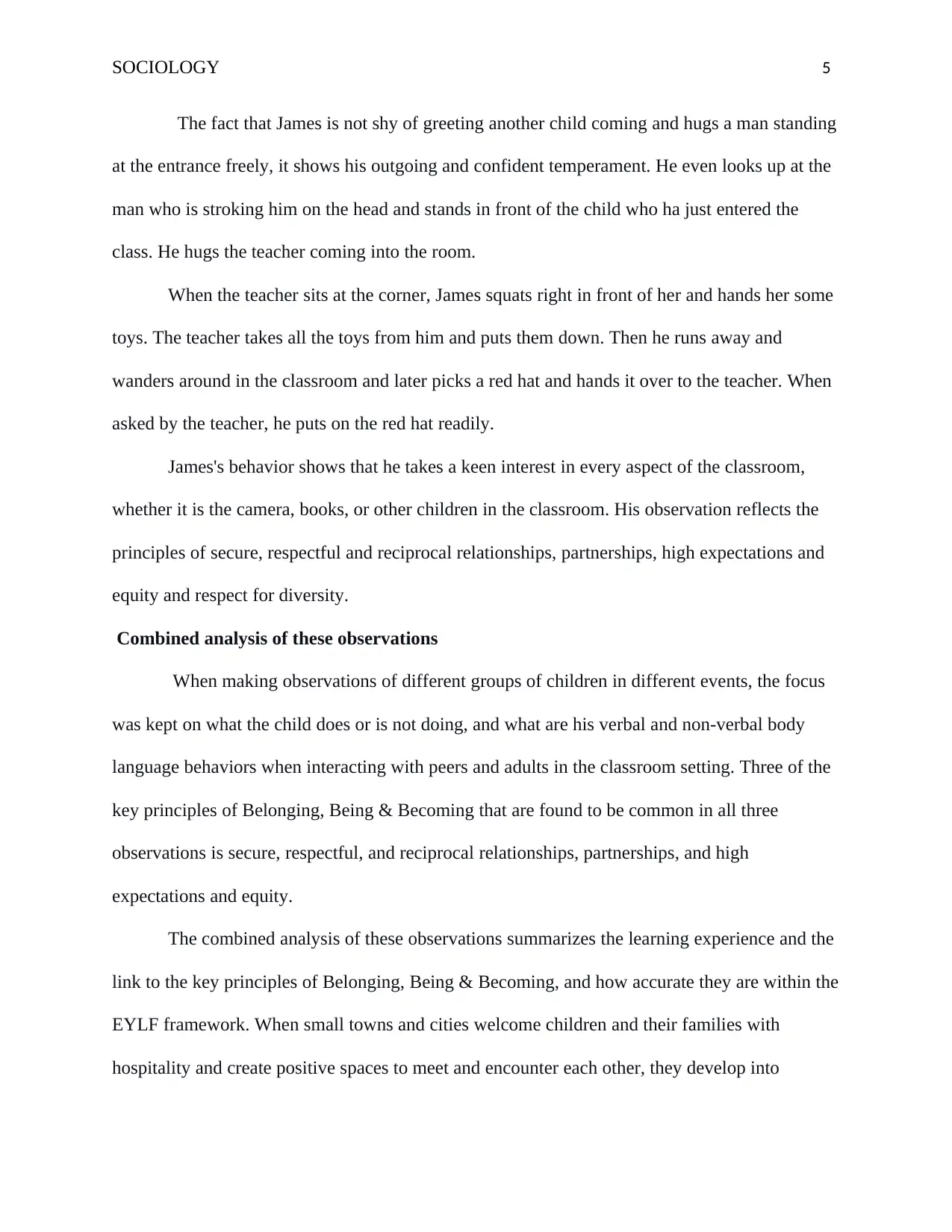
SOCIOLOGY 5
The fact that James is not shy of greeting another child coming and hugs a man standing
at the entrance freely, it shows his outgoing and confident temperament. He even looks up at the
man who is stroking him on the head and stands in front of the child who ha just entered the
class. He hugs the teacher coming into the room.
When the teacher sits at the corner, James squats right in front of her and hands her some
toys. The teacher takes all the toys from him and puts them down. Then he runs away and
wanders around in the classroom and later picks a red hat and hands it over to the teacher. When
asked by the teacher, he puts on the red hat readily.
James's behavior shows that he takes a keen interest in every aspect of the classroom,
whether it is the camera, books, or other children in the classroom. His observation reflects the
principles of secure, respectful and reciprocal relationships, partnerships, high expectations and
equity and respect for diversity.
Combined analysis of these observations
When making observations of different groups of children in different events, the focus
was kept on what the child does or is not doing, and what are his verbal and non-verbal body
language behaviors when interacting with peers and adults in the classroom setting. Three of the
key principles of Belonging, Being & Becoming that are found to be common in all three
observations is secure, respectful, and reciprocal relationships, partnerships, and high
expectations and equity.
The combined analysis of these observations summarizes the learning experience and the
link to the key principles of Belonging, Being & Becoming, and how accurate they are within the
EYLF framework. When small towns and cities welcome children and their families with
hospitality and create positive spaces to meet and encounter each other, they develop into
The fact that James is not shy of greeting another child coming and hugs a man standing
at the entrance freely, it shows his outgoing and confident temperament. He even looks up at the
man who is stroking him on the head and stands in front of the child who ha just entered the
class. He hugs the teacher coming into the room.
When the teacher sits at the corner, James squats right in front of her and hands her some
toys. The teacher takes all the toys from him and puts them down. Then he runs away and
wanders around in the classroom and later picks a red hat and hands it over to the teacher. When
asked by the teacher, he puts on the red hat readily.
James's behavior shows that he takes a keen interest in every aspect of the classroom,
whether it is the camera, books, or other children in the classroom. His observation reflects the
principles of secure, respectful and reciprocal relationships, partnerships, high expectations and
equity and respect for diversity.
Combined analysis of these observations
When making observations of different groups of children in different events, the focus
was kept on what the child does or is not doing, and what are his verbal and non-verbal body
language behaviors when interacting with peers and adults in the classroom setting. Three of the
key principles of Belonging, Being & Becoming that are found to be common in all three
observations is secure, respectful, and reciprocal relationships, partnerships, and high
expectations and equity.
The combined analysis of these observations summarizes the learning experience and the
link to the key principles of Belonging, Being & Becoming, and how accurate they are within the
EYLF framework. When small towns and cities welcome children and their families with
hospitality and create positive spaces to meet and encounter each other, they develop into
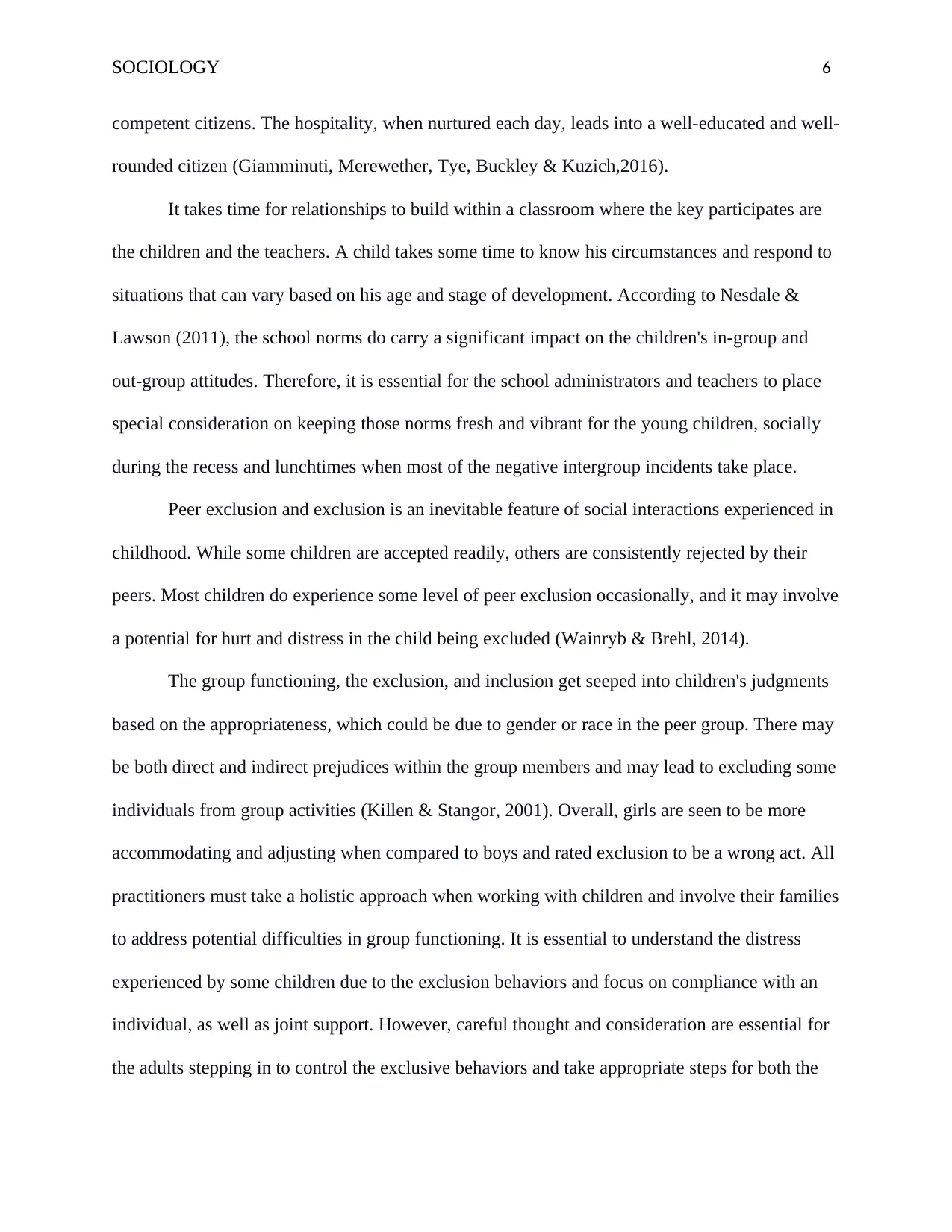
SOCIOLOGY 6
competent citizens. The hospitality, when nurtured each day, leads into a well-educated and well-
rounded citizen (Giamminuti, Merewether, Tye, Buckley & Kuzich,2016).
It takes time for relationships to build within a classroom where the key participates are
the children and the teachers. A child takes some time to know his circumstances and respond to
situations that can vary based on his age and stage of development. According to Nesdale &
Lawson (2011), the school norms do carry a significant impact on the children's in-group and
out-group attitudes. Therefore, it is essential for the school administrators and teachers to place
special consideration on keeping those norms fresh and vibrant for the young children, socially
during the recess and lunchtimes when most of the negative intergroup incidents take place.
Peer exclusion and exclusion is an inevitable feature of social interactions experienced in
childhood. While some children are accepted readily, others are consistently rejected by their
peers. Most children do experience some level of peer exclusion occasionally, and it may involve
a potential for hurt and distress in the child being excluded (Wainryb & Brehl, 2014).
The group functioning, the exclusion, and inclusion get seeped into children's judgments
based on the appropriateness, which could be due to gender or race in the peer group. There may
be both direct and indirect prejudices within the group members and may lead to excluding some
individuals from group activities (Killen & Stangor, 2001). Overall, girls are seen to be more
accommodating and adjusting when compared to boys and rated exclusion to be a wrong act. All
practitioners must take a holistic approach when working with children and involve their families
to address potential difficulties in group functioning. It is essential to understand the distress
experienced by some children due to the exclusion behaviors and focus on compliance with an
individual, as well as joint support. However, careful thought and consideration are essential for
the adults stepping in to control the exclusive behaviors and take appropriate steps for both the
competent citizens. The hospitality, when nurtured each day, leads into a well-educated and well-
rounded citizen (Giamminuti, Merewether, Tye, Buckley & Kuzich,2016).
It takes time for relationships to build within a classroom where the key participates are
the children and the teachers. A child takes some time to know his circumstances and respond to
situations that can vary based on his age and stage of development. According to Nesdale &
Lawson (2011), the school norms do carry a significant impact on the children's in-group and
out-group attitudes. Therefore, it is essential for the school administrators and teachers to place
special consideration on keeping those norms fresh and vibrant for the young children, socially
during the recess and lunchtimes when most of the negative intergroup incidents take place.
Peer exclusion and exclusion is an inevitable feature of social interactions experienced in
childhood. While some children are accepted readily, others are consistently rejected by their
peers. Most children do experience some level of peer exclusion occasionally, and it may involve
a potential for hurt and distress in the child being excluded (Wainryb & Brehl, 2014).
The group functioning, the exclusion, and inclusion get seeped into children's judgments
based on the appropriateness, which could be due to gender or race in the peer group. There may
be both direct and indirect prejudices within the group members and may lead to excluding some
individuals from group activities (Killen & Stangor, 2001). Overall, girls are seen to be more
accommodating and adjusting when compared to boys and rated exclusion to be a wrong act. All
practitioners must take a holistic approach when working with children and involve their families
to address potential difficulties in group functioning. It is essential to understand the distress
experienced by some children due to the exclusion behaviors and focus on compliance with an
individual, as well as joint support. However, careful thought and consideration are essential for
the adults stepping in to control the exclusive behaviors and take appropriate steps for both the
⊘ This is a preview!⊘
Do you want full access?
Subscribe today to unlock all pages.

Trusted by 1+ million students worldwide
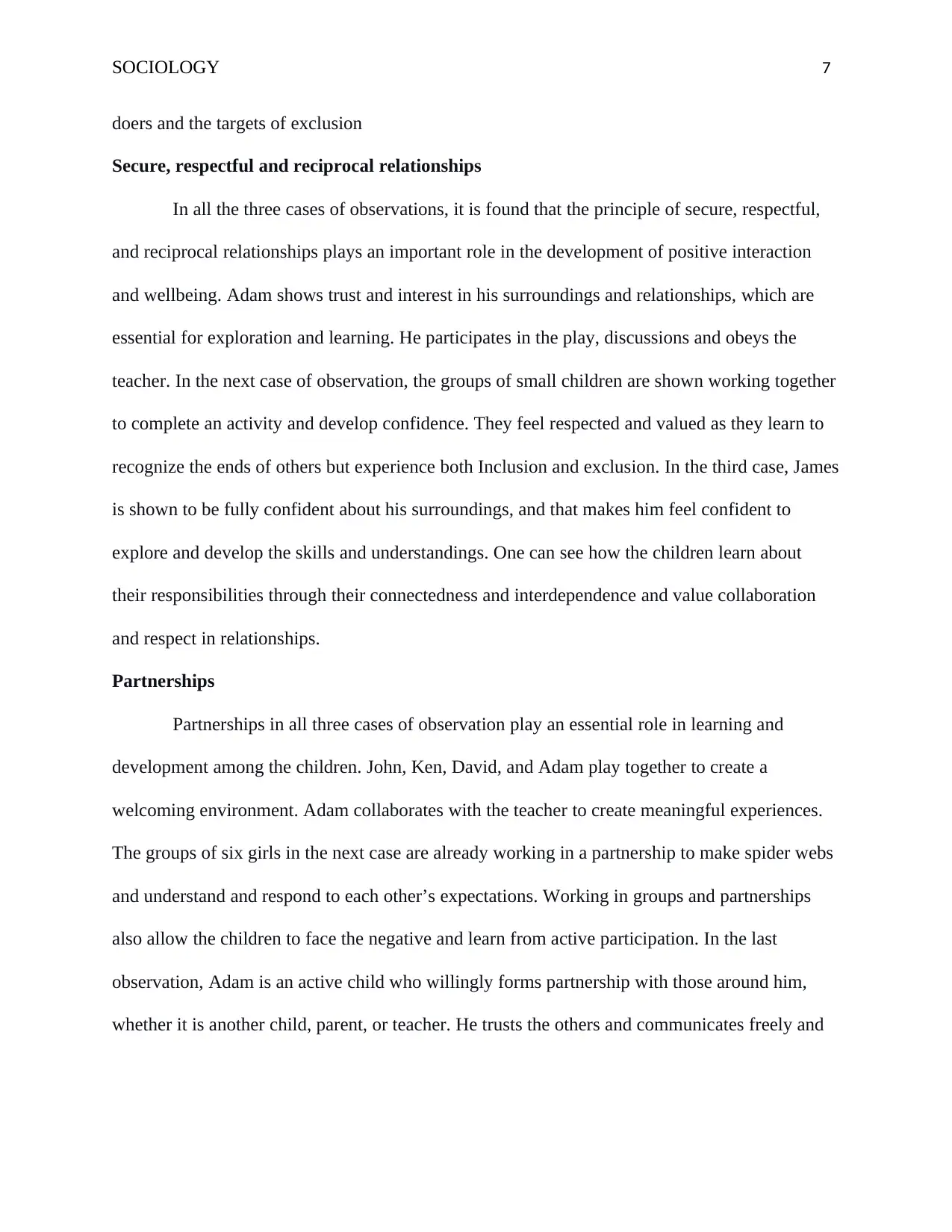
SOCIOLOGY 7
doers and the targets of exclusion
Secure, respectful and reciprocal relationships
In all the three cases of observations, it is found that the principle of secure, respectful,
and reciprocal relationships plays an important role in the development of positive interaction
and wellbeing. Adam shows trust and interest in his surroundings and relationships, which are
essential for exploration and learning. He participates in the play, discussions and obeys the
teacher. In the next case of observation, the groups of small children are shown working together
to complete an activity and develop confidence. They feel respected and valued as they learn to
recognize the ends of others but experience both Inclusion and exclusion. In the third case, James
is shown to be fully confident about his surroundings, and that makes him feel confident to
explore and develop the skills and understandings. One can see how the children learn about
their responsibilities through their connectedness and interdependence and value collaboration
and respect in relationships.
Partnerships
Partnerships in all three cases of observation play an essential role in learning and
development among the children. John, Ken, David, and Adam play together to create a
welcoming environment. Adam collaborates with the teacher to create meaningful experiences.
The groups of six girls in the next case are already working in a partnership to make spider webs
and understand and respond to each other’s expectations. Working in groups and partnerships
also allow the children to face the negative and learn from active participation. In the last
observation, Adam is an active child who willingly forms partnership with those around him,
whether it is another child, parent, or teacher. He trusts the others and communicates freely and
doers and the targets of exclusion
Secure, respectful and reciprocal relationships
In all the three cases of observations, it is found that the principle of secure, respectful,
and reciprocal relationships plays an important role in the development of positive interaction
and wellbeing. Adam shows trust and interest in his surroundings and relationships, which are
essential for exploration and learning. He participates in the play, discussions and obeys the
teacher. In the next case of observation, the groups of small children are shown working together
to complete an activity and develop confidence. They feel respected and valued as they learn to
recognize the ends of others but experience both Inclusion and exclusion. In the third case, James
is shown to be fully confident about his surroundings, and that makes him feel confident to
explore and develop the skills and understandings. One can see how the children learn about
their responsibilities through their connectedness and interdependence and value collaboration
and respect in relationships.
Partnerships
Partnerships in all three cases of observation play an essential role in learning and
development among the children. John, Ken, David, and Adam play together to create a
welcoming environment. Adam collaborates with the teacher to create meaningful experiences.
The groups of six girls in the next case are already working in a partnership to make spider webs
and understand and respond to each other’s expectations. Working in groups and partnerships
also allow the children to face the negative and learn from active participation. In the last
observation, Adam is an active child who willingly forms partnership with those around him,
whether it is another child, parent, or teacher. He trusts the others and communicates freely and
Paraphrase This Document
Need a fresh take? Get an instant paraphrase of this document with our AI Paraphraser
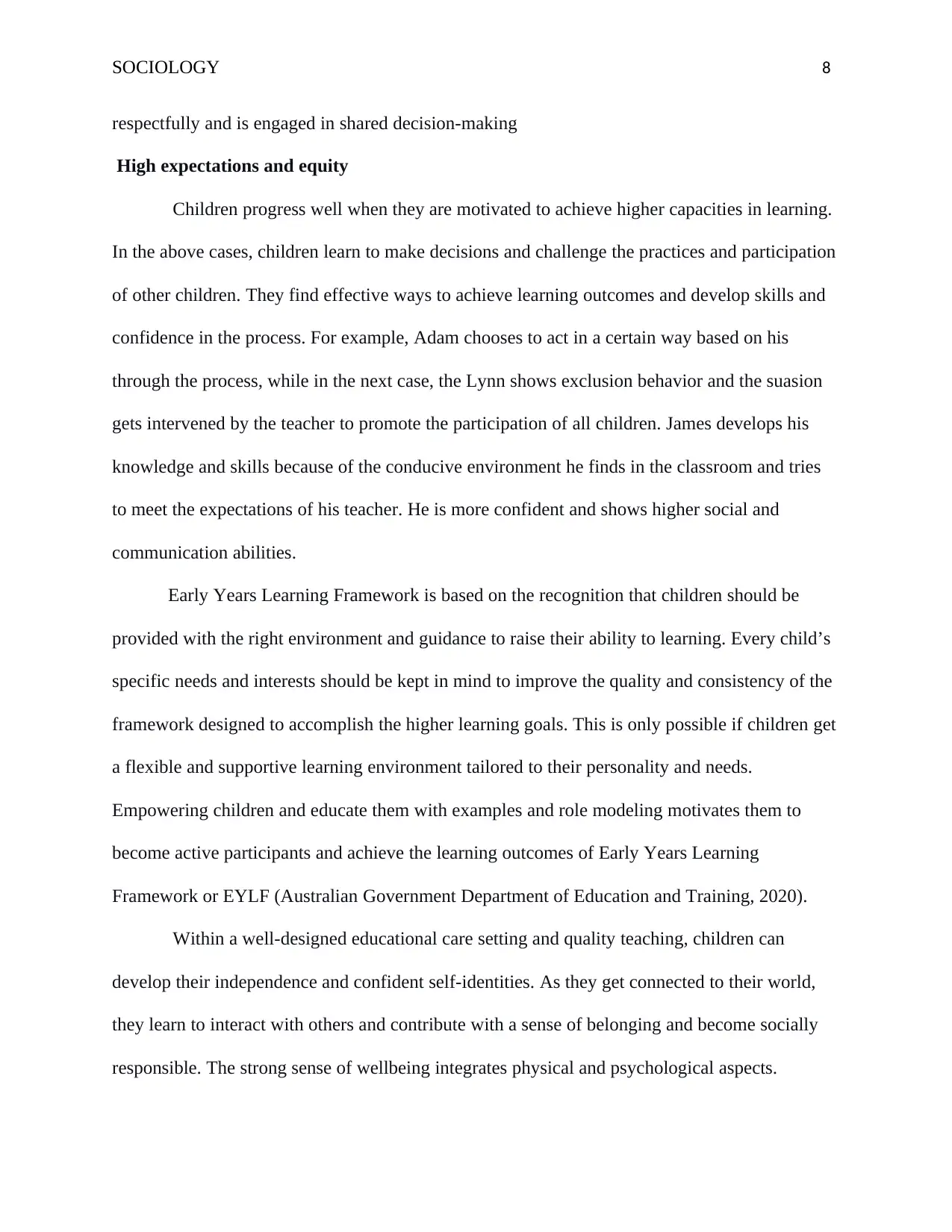
SOCIOLOGY 8
respectfully and is engaged in shared decision-making
High expectations and equity
Children progress well when they are motivated to achieve higher capacities in learning.
In the above cases, children learn to make decisions and challenge the practices and participation
of other children. They find effective ways to achieve learning outcomes and develop skills and
confidence in the process. For example, Adam chooses to act in a certain way based on his
through the process, while in the next case, the Lynn shows exclusion behavior and the suasion
gets intervened by the teacher to promote the participation of all children. James develops his
knowledge and skills because of the conducive environment he finds in the classroom and tries
to meet the expectations of his teacher. He is more confident and shows higher social and
communication abilities.
Early Years Learning Framework is based on the recognition that children should be
provided with the right environment and guidance to raise their ability to learning. Every child’s
specific needs and interests should be kept in mind to improve the quality and consistency of the
framework designed to accomplish the higher learning goals. This is only possible if children get
a flexible and supportive learning environment tailored to their personality and needs.
Empowering children and educate them with examples and role modeling motivates them to
become active participants and achieve the learning outcomes of Early Years Learning
Framework or EYLF (Australian Government Department of Education and Training, 2020).
Within a well-designed educational care setting and quality teaching, children can
develop their independence and confident self-identities. As they get connected to their world,
they learn to interact with others and contribute with a sense of belonging and become socially
responsible. The strong sense of wellbeing integrates physical and psychological aspects.
respectfully and is engaged in shared decision-making
High expectations and equity
Children progress well when they are motivated to achieve higher capacities in learning.
In the above cases, children learn to make decisions and challenge the practices and participation
of other children. They find effective ways to achieve learning outcomes and develop skills and
confidence in the process. For example, Adam chooses to act in a certain way based on his
through the process, while in the next case, the Lynn shows exclusion behavior and the suasion
gets intervened by the teacher to promote the participation of all children. James develops his
knowledge and skills because of the conducive environment he finds in the classroom and tries
to meet the expectations of his teacher. He is more confident and shows higher social and
communication abilities.
Early Years Learning Framework is based on the recognition that children should be
provided with the right environment and guidance to raise their ability to learning. Every child’s
specific needs and interests should be kept in mind to improve the quality and consistency of the
framework designed to accomplish the higher learning goals. This is only possible if children get
a flexible and supportive learning environment tailored to their personality and needs.
Empowering children and educate them with examples and role modeling motivates them to
become active participants and achieve the learning outcomes of Early Years Learning
Framework or EYLF (Australian Government Department of Education and Training, 2020).
Within a well-designed educational care setting and quality teaching, children can
develop their independence and confident self-identities. As they get connected to their world,
they learn to interact with others and contribute with a sense of belonging and become socially
responsible. The strong sense of wellbeing integrates physical and psychological aspects.
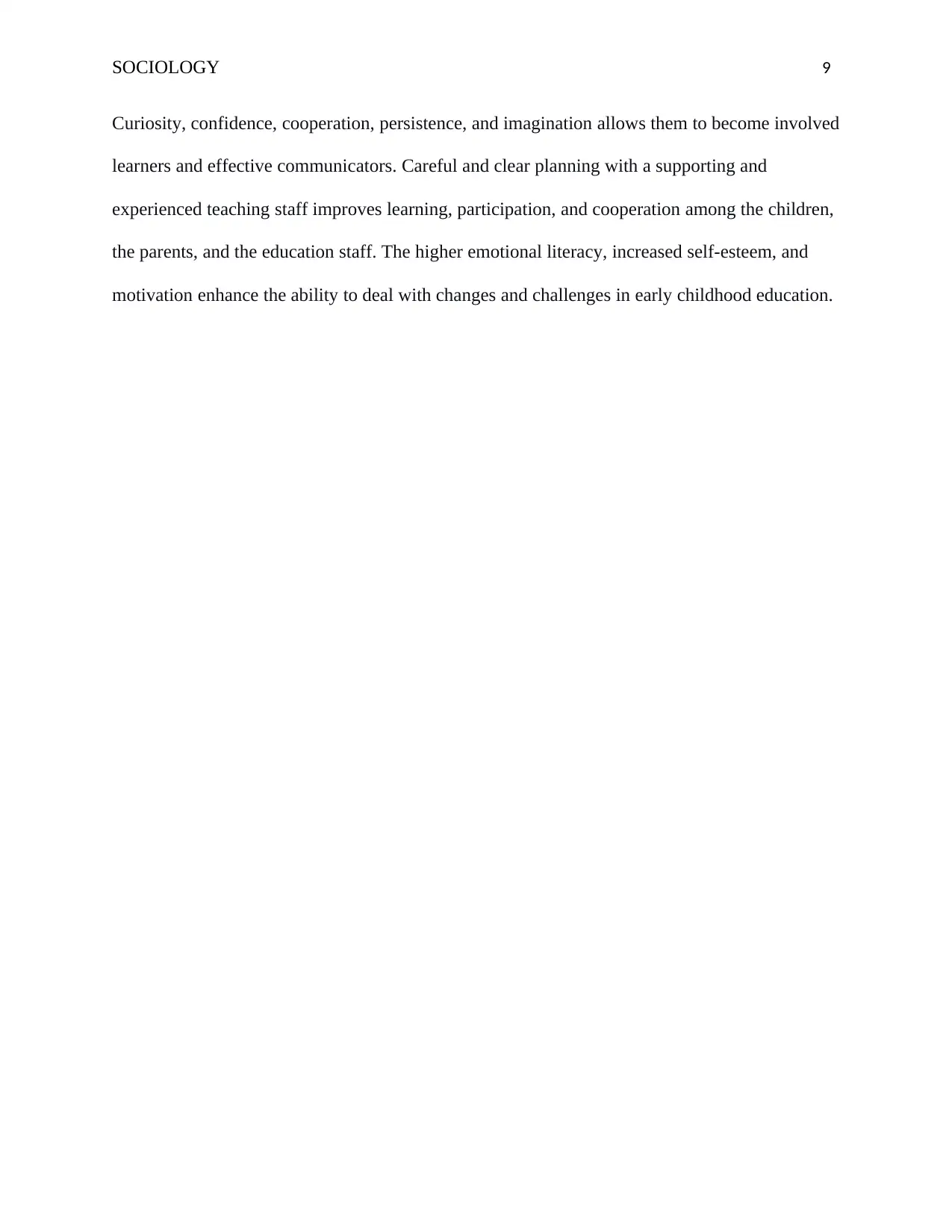
SOCIOLOGY 9
Curiosity, confidence, cooperation, persistence, and imagination allows them to become involved
learners and effective communicators. Careful and clear planning with a supporting and
experienced teaching staff improves learning, participation, and cooperation among the children,
the parents, and the education staff. The higher emotional literacy, increased self-esteem, and
motivation enhance the ability to deal with changes and challenges in early childhood education.
Curiosity, confidence, cooperation, persistence, and imagination allows them to become involved
learners and effective communicators. Careful and clear planning with a supporting and
experienced teaching staff improves learning, participation, and cooperation among the children,
the parents, and the education staff. The higher emotional literacy, increased self-esteem, and
motivation enhance the ability to deal with changes and challenges in early childhood education.
⊘ This is a preview!⊘
Do you want full access?
Subscribe today to unlock all pages.

Trusted by 1+ million students worldwide
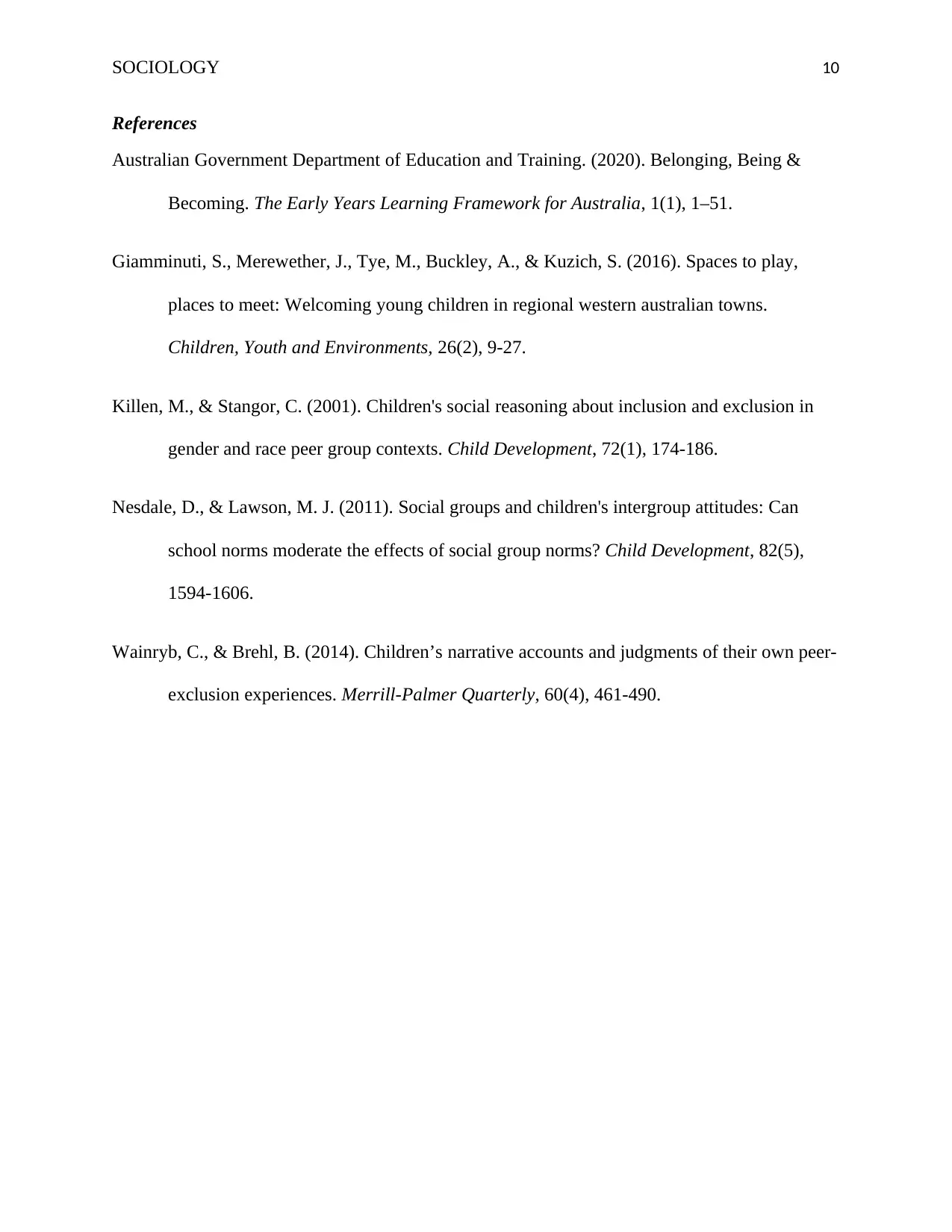
SOCIOLOGY 10
References
Australian Government Department of Education and Training. (2020). Belonging, Being &
Becoming. The Early Years Learning Framework for Australia, 1(1), 1–51.
Giamminuti, S., Merewether, J., Tye, M., Buckley, A., & Kuzich, S. (2016). Spaces to play,
places to meet: Welcoming young children in regional western australian towns.
Children, Youth and Environments, 26(2), 9-27.
Killen, M., & Stangor, C. (2001). Children's social reasoning about inclusion and exclusion in
gender and race peer group contexts. Child Development, 72(1), 174-186.
Nesdale, D., & Lawson, M. J. (2011). Social groups and children's intergroup attitudes: Can
school norms moderate the effects of social group norms? Child Development, 82(5),
1594-1606.
Wainryb, C., & Brehl, B. (2014). Children’s narrative accounts and judgments of their own peer-
exclusion experiences. Merrill-Palmer Quarterly, 60(4), 461-490.
References
Australian Government Department of Education and Training. (2020). Belonging, Being &
Becoming. The Early Years Learning Framework for Australia, 1(1), 1–51.
Giamminuti, S., Merewether, J., Tye, M., Buckley, A., & Kuzich, S. (2016). Spaces to play,
places to meet: Welcoming young children in regional western australian towns.
Children, Youth and Environments, 26(2), 9-27.
Killen, M., & Stangor, C. (2001). Children's social reasoning about inclusion and exclusion in
gender and race peer group contexts. Child Development, 72(1), 174-186.
Nesdale, D., & Lawson, M. J. (2011). Social groups and children's intergroup attitudes: Can
school norms moderate the effects of social group norms? Child Development, 82(5),
1594-1606.
Wainryb, C., & Brehl, B. (2014). Children’s narrative accounts and judgments of their own peer-
exclusion experiences. Merrill-Palmer Quarterly, 60(4), 461-490.
1 out of 10
Related Documents
Your All-in-One AI-Powered Toolkit for Academic Success.
+13062052269
info@desklib.com
Available 24*7 on WhatsApp / Email
![[object Object]](/_next/static/media/star-bottom.7253800d.svg)
Unlock your academic potential
Copyright © 2020–2026 A2Z Services. All Rights Reserved. Developed and managed by ZUCOL.





